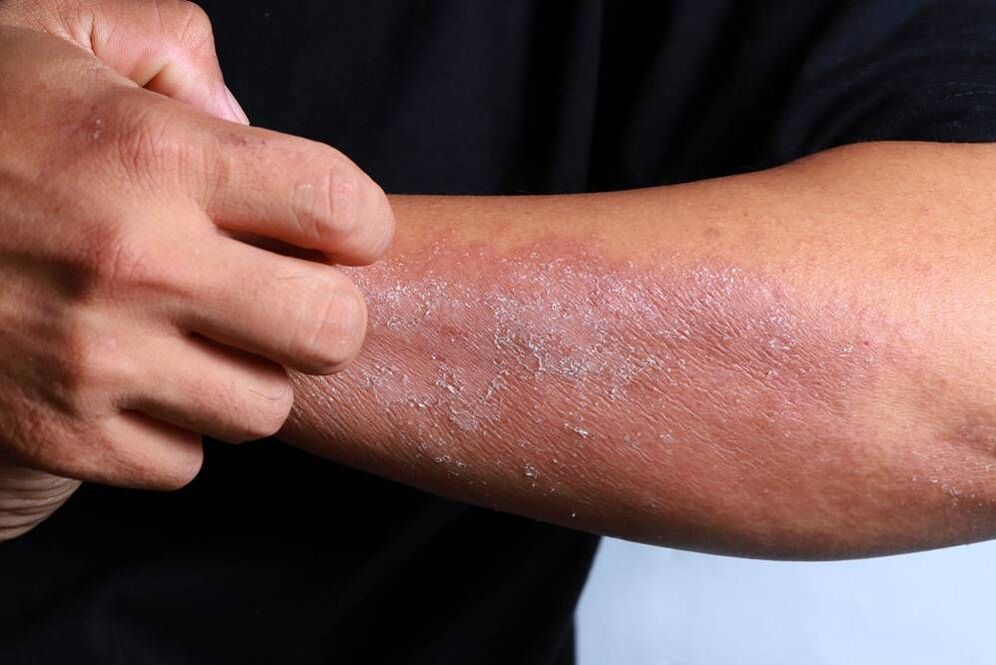
Psoriasisis a chronic inflammatory skin disease. This is a genetic disease that manifests itself in the form of characteristic formations on the patient's body: papules or plaques of pink-red color visible to the eye, the surface of which is scaly and covered with scales. The disease is, as a rule, accompanied by severe itching and pain, causing suffering to patients, both physical and moral. Psoriasis rashes can occur on any part of the body, but are most often localized on the patient’s scalp, elbows, and arms. Chronic psoriasis on the head especially often causes moral discomfort in patients, because it cannot be hidden under clothes.
What is the origin of the name "psoriasis"?
The name of the disease "psoriasis" comes from the Greek word - Psora - scratch (-sya). Indeed, itching of rough, scaly, silvery-white skin, which is difficult to treat, is a typical picture of the manifestation of this disease.
Who is affected by this disease?
A disease such as skin psoriasis affects approximately 3-5% of the population in different countries. Men and women alike. Psoriasis can develop at any age, but usually first appears around the age of 20, often earlier in women than in men. However, the Medical On Group Corporation has collected impressive statistics on the treatment of children and the elderly suffering from this disease.
In addition to heredity, psoriasis has the following causes:
- overactive skin cell division;
- stress;
- reduced immunity after illness.
Answers to frequently asked questions
Is psoriasis contagious?
Ordinary psoriasis vulgaris is a hereditary, genetic disease accompanied by metabolic disorders, endocrine glands, lesions of the immune system. Psoriasis is not contagious! It is not an external infection and there is no need to fear or avoid people suffering from this disease.
Is it likely that children of parents with psoriasis will also have this disease?
Since it is a hereditary, genetic disease, there is such a probability, and quite high: if both parents suffer from psoriasis, then children will also suffer from this disease with a probability of approximately 33. 3%.
Is it good for sick people to spend as much time in the sun as possible?
It is generally accepted that a certain amount of sunlight contributes to the treatment of psoriasis, but in some cases sun exposure, on the contrary, can worsen the process. In any case, before any medical procedure and if any changes in the condition of the skin are detected, it is recommended to consult a professional dermatologist.
What causes periodic occurrences and alleviation of the disease?
Experience shows that psychological stress, stress and neurosis, unhealthy lifestyle and diet cause increased manifestations of psoriasis. In addition, it is not uncommon for the disease to worsen even more precisely in response to irrationally formulated treatment.
Does smoking, alcohol consumption affect the course of the disease?
It is. Smoking and drinking alcohol negatively affect the development of the disease, they can contribute to the intensification of the manifestations of psoriasis.
Treatment of psoriasis. Is it possible?
Hereditary psoriasis on the legs, arms or head is one of the most common but difficult to treat skin diseases. Psoriasis is characterized by scaly redness on the skin, the appearance of which is not caused by infection, but by increased cell division. In a healthy person, complete renewal of skin cells occurs in almost a month, and in a patient - seven times faster.
Exacerbation of psoriasis can be caused by stress and physical exertion, wounds and cuts on the skin, streptococcal upper respiratory tract infection, and drug reactions. Unfortunately, it is impossible to protect oneself from all this, which means that medicine is not yet able to prevent the onset of the disease, nor to cure it completely. But modern dermatologists are quite capable of controlling the course of psoriasis by choosing effective methods of treating the symptoms.
Can psoriasis be cured permanently?
Since it is a hereditary, genetic disease, the treatment of psoriasis offered by modern medicine comes down to removing the external manifestations of the disease, long-term cleansing of the patient's skin from rashes.























